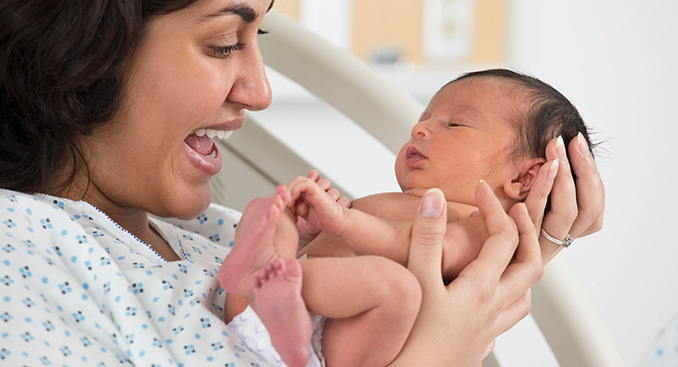- Health & Wellness
- Primary Care
- Service Line
- Women's Health
COVID-19 and Pregnancy and Delivery: Your Questions Answered

For maternity patients who are ready to deliver their baby in the upcoming weeks, concerns about risks associated with COVID-19 are heightened. This unprecedented time of social distancing and confinement while in the final days of pregnancy brings additional questions regarding the health and safety of new moms and their infants. Health systems across the world, including TriHealth, are establishing new protocols to ensure the safety of patients and team members during the pandemic.
“The most important thing for new moms to know is that the best and safest place for delivering your baby is still the hospital,” says Kristin Coppage MD, a maternal and fetal medicine specialist with TriHealth Women’s Services. “Hospitals have implemented and continue to implement safety precautions that have been thoughtfully planned for the welfare of all – including mothers, babies, family and clinical staff.”
Dr. Coppage and her colleagues with TriHealth Women’s Services Tri-State Maternal Fetal Medicine Associates have been receiving many questions from expectant mothers and here she answers the most common and most important of those questions:
Are pregnant women at higher risk for COVID-19?
During pregnancy your immune system changes. This makes pregnant women more susceptible to viral respiratory infections and at higher risk of more severe symptoms. This was seen in pregnant women with other coronavirus infections (SARS-CoV and MERS-CoV) and other viral respiratory infections, such as Influenza. However, based on current limited data, this does not appear to be the case with COVID-19.
How can pregnant patients protect themselves?
The same recommendations for the general public are in place for pregnant women to protect themselves from the virus. Stay at home, maintain social distancing, wash hands often, avoid touching your face and avoid people who are sick or suspect they may have been exposed to COVID-19.
To stay healthy during pregnancy, sleep well, eat a healthy diet, exercise 150 minutes a week (check with your OB provider first) and manage your stress and anxiety.
Who should I contact if I believe I have symptoms similar to COVID-19
For all patients who suspect they may have symptoms of COVID-19, their first call should be to their physician. For pregnant patients, your first call should be to your OB-GYN.
Should I keep my regularly scheduled appointments and screenings during this period of restrictions?
In order to decrease risks to pregnant women, our TriHealth OBGYN providers are creating alternate care models using telemedicine. This will decrease exposure of the pregnant patients to others. If your office has not contacted you, please contact them to determine how your care plan will be changed.
How will my stay at the hospital be impacted with the COVID-19 visitor restrictions?
During this health crisis, visitor restrictions are in place. Essentially, throughout the hospital, only patients in maternity or patients at end of life will be allowed visitors in the hospital. No minors are permitted inside the hospital.
Each maternity patient will be allowed one visitor during their entire delivery stay. The one visitor will be screened upon admission and will need to be rescreened daily to confirm they are still healthy in order to remain in the hospital. All other family members and siblings must remain at home for the delivery and hospital stay.
Maternity patients will be co-located so that any patient with a confirmed or suspected COVID-19 diagnosis will be separated from general patient population
Will my inpatient stay at the hospital be shorter after giving birth to reduce my risk of exposure?
Each maternity patient and infant will be assessed daily by the OB provider and pediatrician. If they are determined to be medically stable for discharge they will be allowed to leave.
If I do have COVID19 while giving birth, will my baby be quarantined way from me after birth?
The CDC recommends separation of an infant from a positive COVID-19 mother in order to decrease transmission to the infant. Before this happens a conversation between the mother and health care team will occur in order to determine what is best for this family.
If I catch the coronavirus, will I give it to my unborn baby?
Currently the risk of transmission in utero is considered minimal if any. There is some concern for increased risk of preterm deliveries, miscarriage and fetal growth restriction if the mother develops COVID-19 while pregnant. In order to keep from passing it to the infant after birth, separation of the infant from sick family members, including the mother, is recommended. If there is interaction between the positive COVID-19 mother and infant the following is recommended:
- Wash your hands before touching the baby
- Wear a face mask while breastfeeding
- Wash your hands before touching a breast pump or parts
Can I breastfeed, if I have a positive COVID-19 diagnosis?
COVID-19 has not been found in breastmilk, but data is limited. Breastmilk is protective against multiple illnesses. We recommend you make the decision to start or continue breastfeeding after discussion with your OB provider.
Can I travel?
Health systems currently recommend following state, local and CDC guidelines.
Related Articles
- Community & News
- Patient Stories
- Service Line
- Women's Health
- Community & News
- Patient Stories
- Service Line
- Women's Health